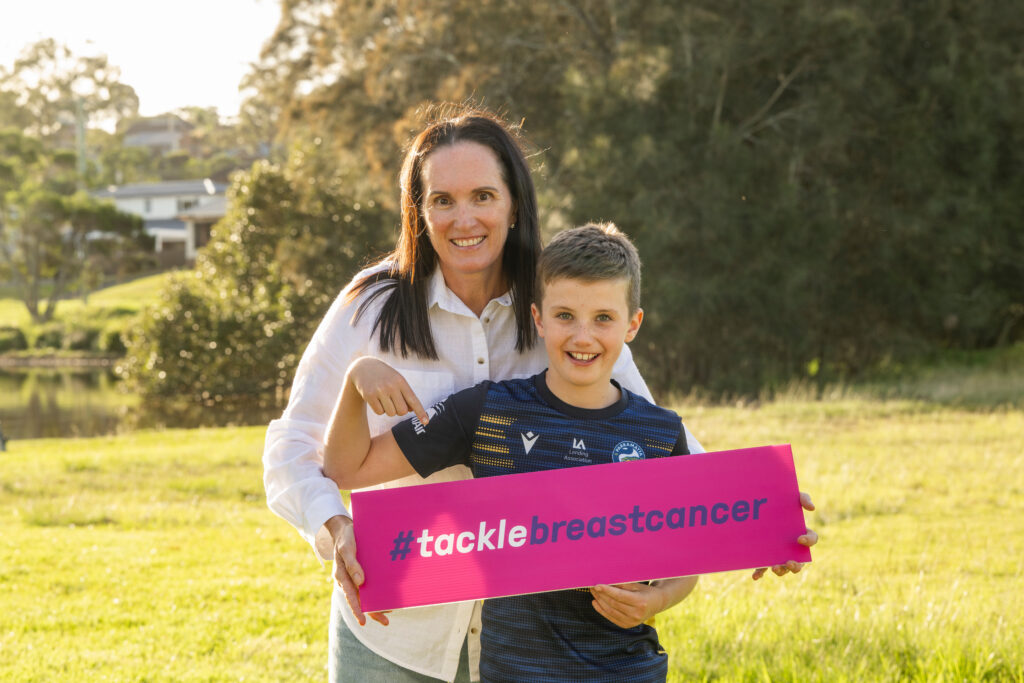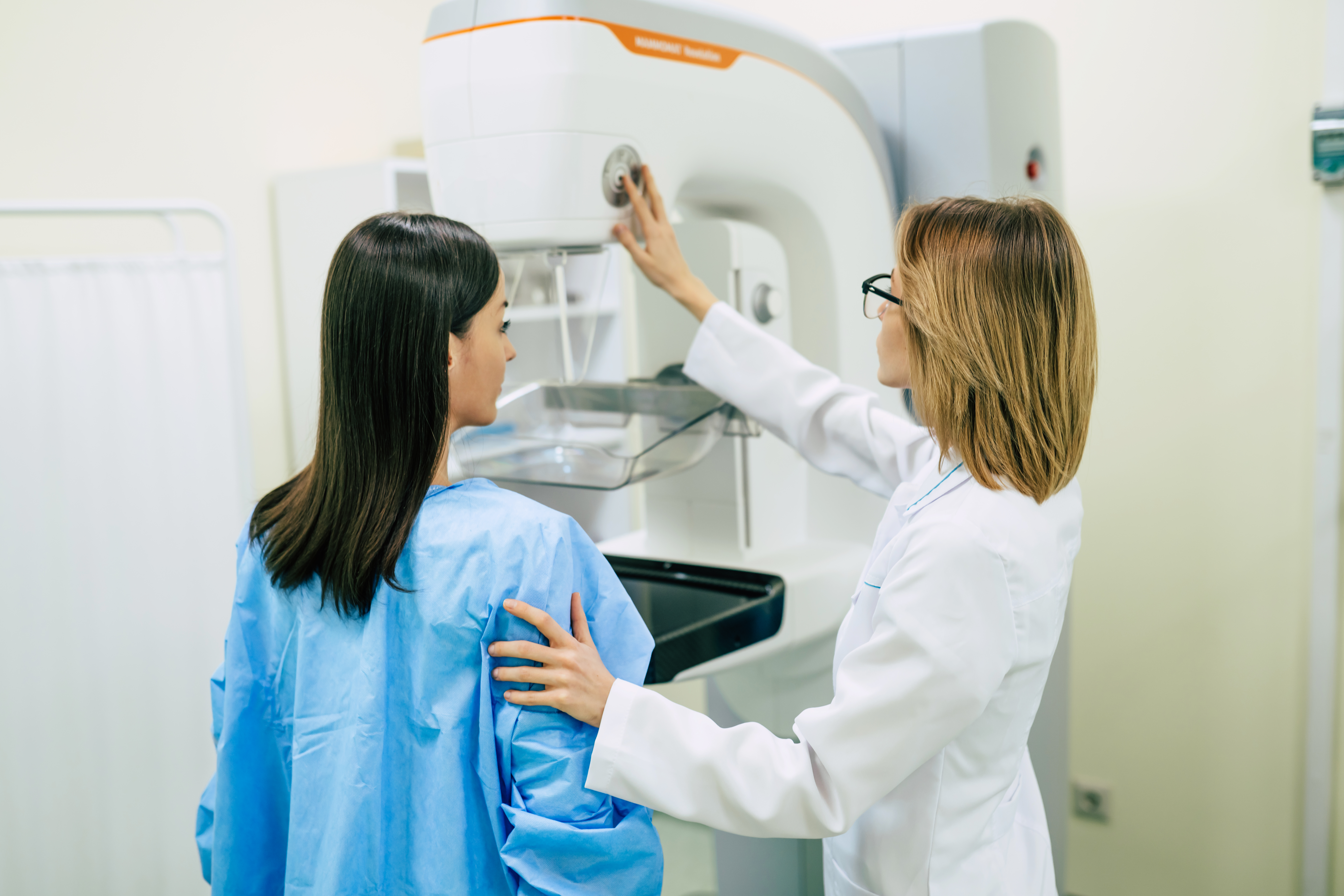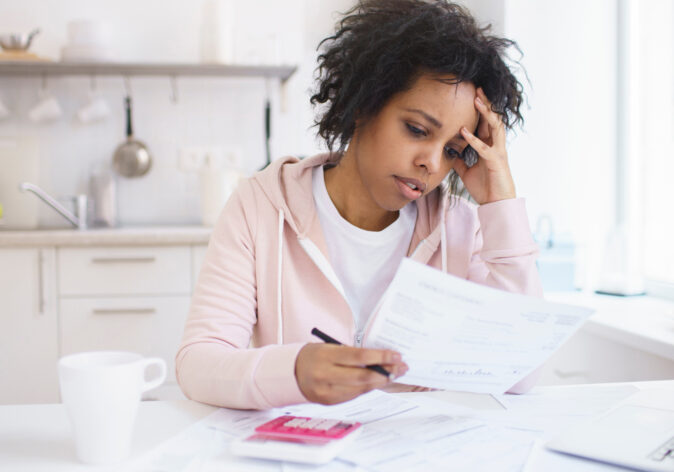2025 marks the inaugural year of the NRLW Magic Round, which is being played in our backyard here in Newcastle, and we are proud to be part of it! Breast Cancer Trials (BCT) is proud to be the match day charity partner for day one of the NRLW Magic Round on 2 August, and we’re shining a spotlight on the power of teamwork in breast cancer research.
Play your part and help #tacklebreastcancer, click here to find out more.
When you’re a mum of two young boys, life is full of chaos. And for Belinda, it also became a time of deep uncertainty when in 2019 she was diagnosed with triple negative breast cancer. In this episode, we spoke with Belinda about navigating a breast cancer diagnosis while raising a young family, the value in having a community around you to offer support during this time and the importance of breast cancer clinical trials research.
“I was diagnosed with triple negative breast cancer in June 2019. I found the lump myself during a self-examination. I was just doing a bit of a check and found a lump on my right breast. I immediately knew that it was abnormal. I called out to Kale and said, quick, quick, quick, come here. Can you have a look at this? And he said, yes, there’s something there.”
“The next morning, after a very sleepless night, I went down to see my doctor and she agreed with me that it was abnormal. Fortunately, she ran over to Hunter Imaging at the Women’s Health Center in Gateshead and they told her to send me over straight away.”
“So, I was so lucky. I went over for my mammogram, and something showed up and I was then sent in for ultrasound with a friend, which was fortunate that she was the radiographer. She at the time knew that it looked abnormal, but didn’t share that with me fortunately. And walked around the back and spoke with the doctor. She said, this is a friend of mine, she’s got a lump. Is there any chance we could biopsy it?”
“I was lucky given that it was a Wednesday, because that’s the only day that the doctors are there. So I popped up on the table and they performed the biopsy to take some samples and 15 minutes later they came back and said, you have breast cancer.”
“I was speechless. I didn’t know what to think. I remember Gabby, who performed the ultrasound said, do you want me to drive you home? Do you want me to ring Kale? And I said, no, no, no, I’ll be fine, what do I do now? And they said we’ll contact your GP so you need to make your way there with your husband.”
“So, I made my way to the car. I don’t remember driving around the lake. I called Kale and said, I have breast cancer. You need to meet me at the doctors. So, I got to the doctors at about 4:30 PM and he was waiting for me, and he was quite frank and said, you have breast cancer. I need to make some calls now and arrange some appointments for you.”
“So, he did all of that. He called over to the breast center and they were expecting his call. During that time Gabby walked around and spoke to them, which I’m grateful for. And they said you’ll see Dr David Clark tomorrow morning at 7:00 AM. So, my head was spinning, within 24 hours I’d gone from not knowing a thing to being told I had breast cancer.”
Listen to the Podcast
We spoke with Belinda about navigating a breast cancer diagnosis while raising a young family, the value in having a community around you to offer support during this time and the importance of breast cancer clinical trials research.
Before your diagnosis, did you know much about breast cancer or did you have any family history of cancer?
“To be honest, I was like the normal person who thought breast cancer was breast cancer. I had no idea of all the subtypes of breast cancer. I was clueless in that regard. There was no family history of breast cancer in my family whatsoever, so I thought breast cancer was just one type of cancer.”
“In terms of my treatment, I had surgery a week after detection. And then I went back into the doctors the following week, and that’s when I was told it was triple negative breast cancer. Originally, I thought I was facing surgery and some radiation, and I would be on my way.”
“But unfortunately, chemotherapy was the only answer for my type of breast cancer because of how aggressive it was, and it wasn’t respondent to hormone therapy or immunotherapy. So, I had six rounds of dense dose chemotherapy once every three weeks at Gateshead. So that took me 18 weeks, so to speak, and then a few weeks break, and then I had five weeks straight of radiation and finished just before Christmas.”
What are some of the biggest challenges, in your opinion, that breast cancer research needs to address?
“I guess the biggest one for me is obviously prevention, but a huge stumbling block is the funds that go towards breast cancer research. There’s a lot of research out there for different types of cancer, and I know that breast cancer does have some funding, but without the required funds to pave the way for these scientists to continue with the trials, they’re not going to happen.”
“But also, prevention is huge for me. Have a conversation with your girlfriends. Talk about getting checked, be vigilant, get checked every year. If you think there’s something there, go and get it checked because that alone may stop you from having to go through what I went through and what other women go through.”
“And we may get to the stage with all this research that there’ll be something quite simple for early-stage breast cancer, and that will come out of a trial or many trials that are happening or going to happen.”
“I can honestly say that prior to being diagnosed, I had no idea about breast cancer research. For me, I was fortunate in that my medical oncologist, Dr Nick, is one of the gurus involved with Breast Cancer Trials and Nick spoke to me in figures with survival rates and whatnot, and I had so many questions for him, and he would just shake his head.”
At what point in your cancer journey did you start to become interested in what’s happening within Breast Cancer Trials research?
“My oncologist, Dr Nick said to me, you need to listen to some of the research through Breast Cancer Trials, and I said who are Breast cancer trials? And told me that he was one of the chief medical scientists on their Scientific Advisory Committee, and that Breast Cancer Trials conduct trials across the world on women that are early-stage, late-stage terminal and whatnot.”
“So, I literally jumped on board and listened to Nick talk. And from that point forward I went, OK, this is going to be my source of truth. I will listen to this, and I’d met women that were on active trials, and I listened to various podcasts, so I learned pretty early on about what Breast Cancer Trials actually does for women and men, because men get breast cancer too, in relation to breast cancer research.”
How has breast cancer influenced your outlook on life?
“Breast cancer totally changed my life, and obviously the life of my family, my children were young, and it blind-sided my husband and I. From the get-go, we made a very conscious decision that we would tackle this head on, that we wouldn’t back down from it, and we would do whatever we had to do to beat this, because I was determined to be a mum to my kids for many, many years to come.”
“I think cancer is as much a medical game as it is a mindset, and my mindset was, I will beat this full stop. My hope for the future, for me personally, is to live a long and healthy life with my husband and kids, but I also hope that we are able to find a cure for breast cancer to stop women and men dying every day from a disease that hopefully can be eradicated, or at least prevented, so that patients are subjected to a much less severe treatment regime.”



